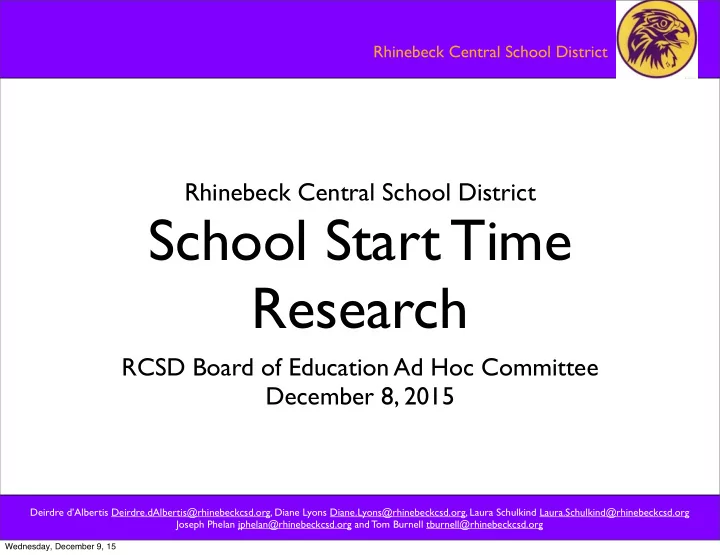

Rhinebeck Central School District Rhinebeck Central School District School Start Time Research RCSD Board of Education Ad Hoc Committee December 8, 2015 Deirdre d’Albertis Deirdre.dAlbertis@rhinebeckcsd.org, Diane Lyons Diane.Lyons@rhinebeckcsd.org, Laura Schulkind Laura.Schulkind@rhinebeckcsd.org Joseph Phelan jphelan@rhinebeckcsd.org and Tom Burnell tburnell@rhinebeckcsd.org Wednesday, December 9, 15
Rhinebeck Central School District Why are we exploring this issue now? “Adolescents today face a widespread chronic health problem: sleep deprivation. Although society often views sleep as a luxury that ambitious or active people cannot afford, research shows that getting enough sleep is a biological necessity, as important to good health as eating well or exercising. Teens are among those least likely to get enough sleep; while they need on average 9 1/4 hours of sleep per night for optimal performance, health and brain development, teens average fewer than 7 hours per school night by the end of high school, and most report feeling tired during the day (Wolfson & Carskadon, 1998).” https://sleepfoundation.org/sleep-news/backgrounder-later-school-start-times Deirdre d’Albertis Deirdre.dAlbertis@rhinebeckcsd.org, Diane Lyons Diane.Lyons@rhinebeckcsd.org, Laura Schulkind Laura.Schulkind@rhinebeckcsd.org Wednesday, December 9, 15
Rhinebeck Central School District Why are we exploring this issue now? “Key changes in sleep patterns and needs during puberty can contribute to excessive sleepiness in adolescents, which can impair daytime functioning. First, daytime sleepiness can increase during adolescence, even when teens’ schedules allow for optimal amounts of sleep (Carskadon, Vieri, & Acebo, 1993). Second, most adolescents undergo a sleep phase delay, which means a tendency toward later times for both falling asleep and waking up. Research shows the typical adolescent’s natural time to fall asleep may be 11 pm or later; because of this change in their internal clocks, teens may feel wide awake at bedtime, even when they are exhausted (Wolfson & Carskadon, 1998).” https://sleepfoundation.org/sleep-news/backgrounder-later-school-start-times Deirdre d’Albertis Deirdre.dAlbertis@rhinebeckcsd.org, Diane Lyons Diane.Lyons@rhinebeckcsd.org, Laura Schulkind Laura.Schulkind@rhinebeckcsd.org Wednesday, December 9, 15
Rhinebeck Central School District Why are we exploring this issue now? “Findings of the tendency for adolescent sleep patterns to be delayed have been reported not only in North America, but also in South America, Asia, Australia and Europe (Andrade & Menna Barreto, 2002; Carskadon & Acebo, 1997; Ishihara, Honma & Miyake, 1990; Bearpark & Michie, 1987; Strauch & Meier, 1988; LeBourgeois et al., 2005; Thorleifsdottir et al., 2002). The diversity of such research supports the view that intrinsic developmental changes play a role in delayed sleep patterns in adolescents. This biological shift sets the stage for other social and environmental conditions that make it easier for these adolescents to stay awake at night and wake up sleep deprived.” https://sleepfoundation.org/sleep-news/backgrounder-later-school-start-times Deirdre d’Albertis Deirdre.dAlbertis@rhinebeckcsd.org, Diane Lyons Diane.Lyons@rhinebeckcsd.org, Laura Schulkind Laura.Schulkind@rhinebeckcsd.org Wednesday, December 9, 15
Rhinebeck Central School District Why are we exploring this issue now? “The reasons for teens’ lack of sleep are complex, and include homework, extracurricular activities, after-school jobs and use of technology that can keep them up late on week nights. The AAP recommends pediatricians counsel teens and parents about healthy sleep habits, including enforcing a media curfew. The AAP also advises health care professionals to educate parents, educators, athletic coaches and other stakeholders about the biological and environmental factors that contribute to insufficient sleep. But the evidence strongly suggests that a too-early start to the school day is a critical contributor to chronic sleep deprivation among American adolescents. An estimated 40 percent of high schools in the U.S. currently have a start time before 8 a.m.; only 15 percent start at 8:30 a.m. or later. The median middle school start time is 8 a.m., and more than 20 percent of middle schools start at 7:45 a.m. or earlier.” https://www.aap.org/en-us/about-the-aap/aap-press-room/pages/Let-Them-Sleep- AAP-Recommends-Delaying-Start-Times-of-Middle-and-High-Schools-to-Combat- Teen-Sleep-Deprivation.aspx Deirdre d’Albertis Deirdre.dAlbertis@rhinebeckcsd.org, Diane Lyons Diane.Lyons@rhinebeckcsd.org, Laura Schulkind Laura.Schulkind@rhinebeckcsd.org Wednesday, December 9, 15
Rhinebeck Central School District Why are we exploring this issue now? In July of 2010, a research study published by Judith A. Owens, MD, MPH; Katherine Belon, BA; Patricia Moss, PhD in JAMA Pediatrics (Journal of the American Medical Association) entitled Impact of Delaying School Start Time on Adolescent Sleep, Mood, and Behavior concluded that “A modest delay in school start time was associated with significant improvements in measures of adolescent alertness, mood, and health. The results of this study support the potential benefits of adjusting school schedules to adolescents' sleep needs, circadian rhythm, and developmental stage.” http://archpedi.jamanetwork.com/article.aspx?articleid=383436 Deirdre d’Albertis Deirdre.dAlbertis@rhinebeckcsd.org, Diane Lyons Diane.Lyons@rhinebeckcsd.org, Laura Schulkind Laura.Schulkind@rhinebeckcsd.org Wednesday, December 9, 15
Rhinebeck Central School District Why are we exploring this issue now? In a high-profile policy statement published in August 2014, the American Academy of Pediatrics (AAP) recommended that “middle and high schools delay the start of class to 8:30 a.m. or later. Doing so will align school schedules to the biological sleep rhythms of adolescents, whose sleep-wake cycles begin to shift up to two hours later at the start of puberty.” https://www.aap.org/en-us/about-the-aap/aap-press-room/pages/Let-Them-Sleep- AAP-Recommends-Delaying-Start-Times-of-Middle-and-High-Schools-to-Combat- Teen-Sleep-Deprivation.aspx Deirdre d’Albertis Deirdre.dAlbertis@rhinebeckcsd.org, Diane Lyons Diane.Lyons@rhinebeckcsd.org, Laura Schulkind Laura.Schulkind@rhinebeckcsd.org Wednesday, December 9, 15
Rhinebeck Central School District Why are we exploring this issue now? And in August 2015, the Centers for Disease Control declared insufficient sleep for adolescents to be a public health concern best addressed by adopting later school start times. “Schools that have a start time of 8:30 AM or later allow adolescent students the opportunity to get the recommended amount of sleep on school nights: about 8.5 to 9.5 hours. Insufficient sleep is common among high school students and is associated with several health risks such as being overweight, drinking alcohol, smoking tobacco, and using drugs – as well as poor academic performance. The proportion of high school students who fail to get sufficient sleep (2 out of 3) has remained steady since 2007, according to the 2013 Youth Risk Behavior Surveillance Report.” http://www.cdc.gov/media/releases/2015/p0806-school-sleep.html Deirdre d’Albertis Deirdre.dAlbertis@rhinebeckcsd.org, Diane Lyons Diane.Lyons@rhinebeckcsd.org, Laura Schulkind Laura.Schulkind@rhinebeckcsd.org Wednesday, December 9, 15
Recommend
More recommend